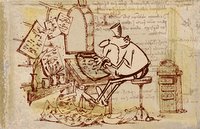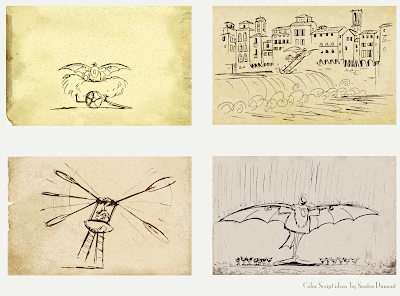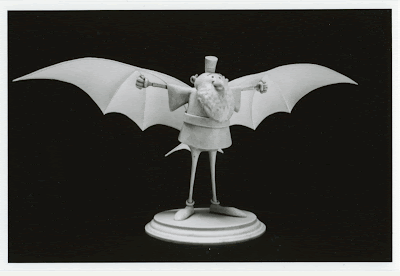It being New Years and all I thought I would throw in with my own top ten list of sorts. It isn't really a top ten but sort of ten suggestions, thoughts or learned things from making an animated independent short. So over the next week and a half I'll dispense with this wisdom for whatever it's worth. Maybe it will help you in your own endeavors. Perhaps, some of you have New Year Resolutioned to make that film finally. Well, I hope this helps.
Starting with - in no order of importance:
1) Those helping you need to get something out of it too. Perhaps one of the most important lessons I have learned working on Leonardo and working with people in general is that everyone needs to get something from the collaboration. This took me some time to figure out. A friend warned me when I started that no one will deliver if you don't pay them. I thought "Oh no, they will love the project. They will want to do it and besides they're my friends." Well he was right to an extent. What I learned is - You, as the main creator, get the film and all the good ( and the bad ) that comes with that, the artists working for you, if they are going to deliver, need something too. This is often thought of in the form of money but truthfully even when people are paid the really good work comes when they are stretching an old muscle, trying something new and/or being challenged. I see this at work all the time and it was true on Your Friend the Rat. It could be getting a chance to do something they normally wouldn't. Generally it is really hard to get people to work for nothing, on their off hours without some benefit to them. For example my first editor, Chris Vallance, was an editorial assistant he needed something to learn to cut with so I told him I had this short I was storyboarding if he wanted to he could help me make the reel. Chris did and I have him to thank for getting this whole thing rolling and he got experience, something strong for his reel and an eternally grateful friend. So find someone who isn't doing the thing they want to do ( like your not, that maybe why your making your short) and give them a chance to do it.
A side note: It is important to realize no one will care as much for the film as you will. Many people have passed through the corridors of Leo, some have helped and some haven't no matter what good intentions they had. This is to be expected and there is no ill will, you just move on. But you have to be prepared to fill in where others have dropped out or have an alternative plan. For example: I found it hard to get some animators to make multiple changes to their scenes. So I found I would just go in and fix the scenes. I would tell the animator I was doing it of course. They never seemed to mind.
tomorrow:
2) A plan - a storyreel, animatic, lica reel whateverI can't stress this enough. You have to have a plan for your film. A blueprint.














